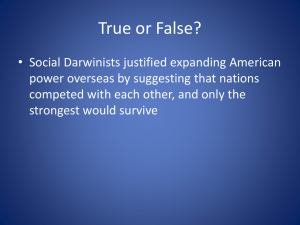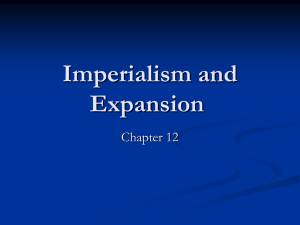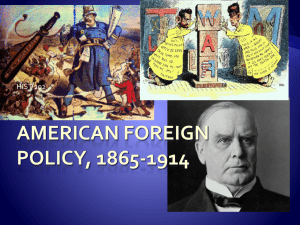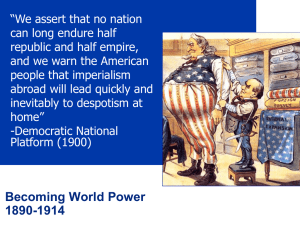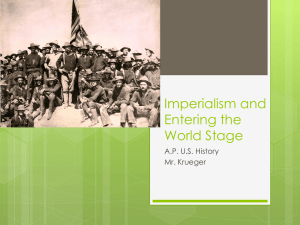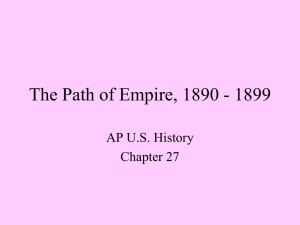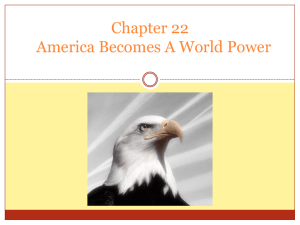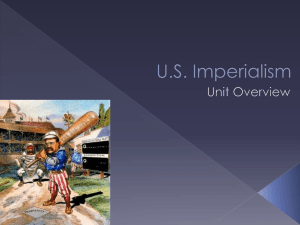American Imperialism In Detail
advertisement
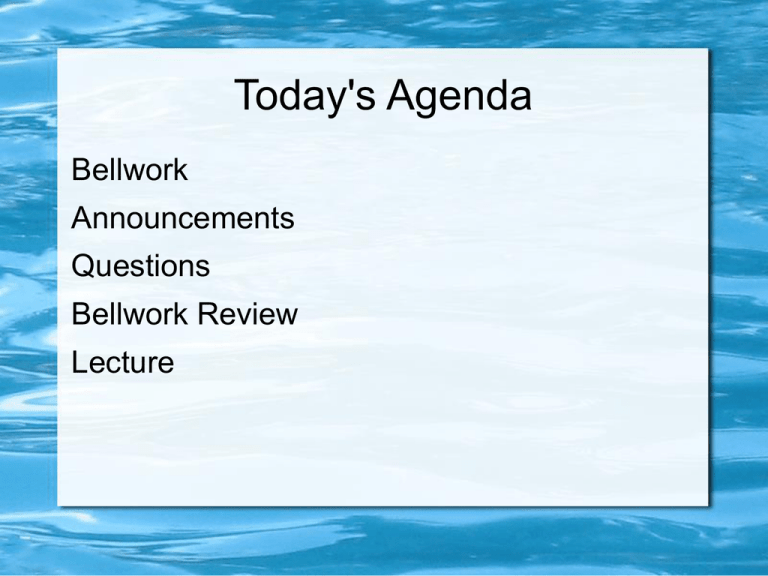
Today's Agenda Bellwork Announcements Questions Bellwork Review Lecture American Imperialism II US.22 Assess the causes of American imperialism in the late 19th and early 20th centuries, including the desire for raw materials and new markets, yellow journalism, and the desire to spread American democratic and moral ideals. (E, G, P) US.23 Evaluate the arguments of interventionists and noninterventionists of the period, including Alfred T. Mahan, Senator Albert Beveridge, Mark Twain, and Theodore Roosevelt. (C, E, P). US.25 Draw evidence from informational texts to compare and contrast Theodore Roosevelt’s Big Stick diplomacy, William Taft’s Dollar Diplomacy, and Woodrow Wilson’s Moral Diplomacy. (G, H, P) Objective Understand how the United States had the desire and the ability to spread its beliefs and needs around the world through American Imperialism America Imperialism II Assess the causes of American imperialism in the late 19th and early 20th centuries, including the desire for raw materials and new markets, yellow journalism, and the desire to spread American democratic and moral ideals. John Green: http://www.youtube.com/watch?v=QfsfoFqsFk4 We Grew.... When the Spanish-American War was over, the U.S. garnered four of Spain's former colonies. Pro-Imperialists saw this as a chance to take them for our use before another European power had their chance. The rush for Naval Superiority against the rest of the World was a driving force. We were getting full... End of the frontier: 1890 report from the Superintendent of the Census https://www.census.gov/dataviz/visualizations/001/ Many Americans believed the United States had to expand to other areas or the country was doomed to become overcrowded. Increase in population from immigration and better health, increased wealth, and industrial production demanded more and resources. There was a growing fear that the United States could exhaust its supply of resources. A Country Under Pressure The Panic of 1893 convinced some businessmen industry had overexpanded resulting in overproduction & underconsumption. Supply and Demand. A lot of businessmen wanted to own a factory, but where were their customers going to come from? Strikes and Labor unrest/violence and Farmers unrest (Populism) became rampant due to industrialism. Overseas markets were viewed as the solution to over production from factories and farmes. Our experience of supplanting the Plains Indian tribes after the Civil War had established a precedent for exerting colonial control over dependent people. Those Pesky Germans... Germany became our biggest imperialist competitor and largely spurred U.S. into imperialism; Germany sought colonies in Africa, Asia, Latin America & Caribbean. A Book Put America into Action A Man Had a Plan Captain Alfred Thayer Mahan: “The Influence of Sea Power upon History” (1890) His Thesis: Control of the sea was the key to world dominance and empire. Control the oceans, control the world. The United States should build large navy and build defensive bases and refueling stations, strategically placed around the globe. Hawaii and other Pacific islands are critical to this plan. It is imperative we build a canal in Central America to create a quick route from the Atlantic to the Pacific Ocean An Arms Race Began A book created a naval race among the world's great powers. Yellow journalists pushed for a modern navy of steel ships for our very survival as a nation. By 1898, the United States had fifth most powerful navy; third by 1900 behind Great Britain and France. The Battleship http://www.navy.mil/navydata/ships/battleship s/bb-list.asp The Plan Came Together Space – wait, not Space... The Final Frontier :-) Foreign trade becoming increasingly important to American economy in late 19th century. (Not Space....) Americans considered acquiring new colonies to expand markets further. People were potential customers. Desire to compete with Europe for overseas empires. Some Americans were watching European's success in Africa and Asia with envy and jealousy. Why can't we do that? Between 1870 and 1900, Europeans had taken over 1/5 of land and 1/10 of population of the world. “Our Country” (1885) Pro-Imperialism Josiah Strong: Our Country(1885) His book advocated superiority of Anglo-Saxon civilization over all others. He urged Americans to spread religion & democratic values to the “backward” peoples of the world. The yellow journalism of Joseph Pulitzer and William Randolph Hearst stimulated Americans interest abroad. We are the Best... Theodore Roosevelt and Henry Cabot Lodge believed that Social Darwinism meant earth belonged to the strong & fit, including the United States Stronger nations dominating weak ones was part of natural law and if the United States was to survive the competition of the modern world, it too would have to become an imperial power itself before it was colonized again. Senator Albert Beveridge: The American Republic is part of the movement of a superior race, ordained by God. Henry Cabot Lodge US Senator – loved Teddy, hated Woodrow Wilson: http://www.biography.com/people/henrycabot-lodge-9384815 Senator Albert Beveridge Beveridge was very Pro-Imperialism: http://www.fordham.edu/halsall/mod/1898bev eridge.asp Pan-Americanism James G. Blaine was Secretary of State under Presidents Garfield and Harrison. “Big Sister” policy aimed to gain Latin American support of U.S. leadership and to open Latin American markets to U.S. products. It essentially guaranteed U.S. authority in Latin America in 1880s. First Pan-American Conference was held in Washington, D.C. in 1889. Our proposals were rejected by the Latin American countries. European goods were cheaper for Latin Americans to purchase. Another reason for rejection was due to fears of U.S. dominance. The only agreement was future meetings could be held. We Almost Went to War Samoan crisis at Pago Pago United States and German navies nearly engaged each other in 1889 over the Samoan Islands. Germany did not wish to provoke U.S. and agreed to settlement, resolved in a 1900 treaty with Germany and Britain U.S. gained 76 square miles -- American Samoa including Pago Pago, Germany received the two largest islands and Britain was compensated with other territories in the Pacific. We almost go to War (Again) Venezuela Boundary Dispute, 1895-1896 The Boundary between British Guiana and Venezuela had been in dispute for over half a century. Gold was discovered in the border region. President Cleveland warned Britain to not to take Venezuelan territory because it violated the Monroe Doctrine. The United States declared it now called the shots in the Western Hemisphere. Britain denied the legality of Monroe doctrine. President Cleveland had a Plan President Cleveland asked for an appropriation from Congress to create a commission of experts who could create an equitable border between Venezuela and British Guiana. He stated that if Britain refused to accept it, the United States would go to war. Britain had no real urge to fight despite a naval superiority of 32-5 in battleship class warships. Britain was entangled in the Boer War in South Africa. Britain feared that we could attack a vulnerable Canada. British merchant marine would be vulnerable to American commerce raiders. Britain was preoccupied with German naval threat and Russian & French unfriendliness so London consented to arbitration. We Won Without Firing a Shot The prestige of our Monroe Doctrine was enhanced. Latin American republics were pleased by our determination to protect them. Britain courted us for friendship and a potential ally in the face of the continental threat. This left us able to pursue a more aggressive foreign policy. Hawaii Since early 19th century, America gradually came to regard Hawaiian Islands as an extension of our Pacific Coast. The 1890 McKinley Tariff raised barriers against Hawaiian sugar. American sugar planters sought annexation as it would eliminate tariffs. Queen Liliuokalani, a nationalist, insisted Hawaiians should control Hawaii and white planters, mostly Americans, became alarmed at the Queen's policies and the American tariff. White planters, led by Sanford B. Dole, organized a successful revolt in 1893 even though there were a tiny minority. They were assisted by American troops who landed under the unauthorized orders of U.S. minister in Honolulu, John C. Stevens. Stevens said “The Hawaiian pear is now fully ripe and this is the golden hour for the U.S. to pluck it.” Cleveland says NO! A treaty for annexation was rushed to Washington for passage. Before treaty could be passed through Senate, Cleveland assumed the office of President and refused to sign any annexation bill and sent special investigator to Hawaii. The findings indicated the vast majority of Hawaiians had no desire to be annexed, that the Provisional government had been established by force and Cleveland ordered American troops to be removed from Hawaii. Some will not take NO for an answer President Cleveland was unsuccessful in reinstating the queen to her throne. America public opinion would not have tolerated force to unseat white planters. Cleveland could not send troops to attack the white planters. Revolutionaries proclaimed a Hawaiian Republic on July 4, 1894 with Dole as president. Hawaii was annexed in 1898, and Dole served as the territorial governor from 1900-03. Hawaii was our first fully-fledged imperialistic debate in our nation's history. Cleveland was savagely criticized by some for trying to stem the new Manifest Destiny. Others viewed Cleveland's motives as honorable in the face of international imperialism. Cuba Cuba Atrocities in Cuba were sensationalized and even made up by the “yellow press” Spanish's misrule of Cuba as well as the devastating WilsonGorman Tariff of 1894 damaged Cuba's sugar-based economy. Many of the plantations were owned by Americans. A new Cuban rebellion in the 1890s resulted in American property losses. Spain reacted. 'Reconcentration' - The Spanish military concentrated masses of Cuban civilians in areas under their control. About 100,000 died between 1896 and 1898 in concentration camps. Spain's leader in Cuba, Valeriano Weyler, was portrayed in U.S. as “Butcher Weyler” Americans Were Upset President Cleveland refused to intervene in Cuba and issued a neutrality proclamation. We did offer mediation in the conflict but Spain refused. Pulitzer and Hearst attempted to out do each other and lesser competitors also became involved. Hearst sent artist Frederic Remington to Cuba to draw sketches. When Remington reported conditions not bad enough to warrant hostilities, Randolph allegedly replied, “You furnish the pictures & I'll furnish the war.” Remington depicted Spanish customs officials as brutally disrobing and searching an American woman. In reality, female attendants did that duty. “I'll furnish the war” Remington We Almost Go to War (Again) McKinley's presidency began stronger rhetoric toward Spain. In autumn of 1897, McKinley came close to delivering an ultimatum to Spain that would have resulted in war. Spain ended the 'Reconcentration' in 1897, removed Weyler from Cuba and gave some autonomy to Cubans. It appeared that war had been avoided. Cubans Revolt Spanish people in Cuba rioted to protest Spain's talk of granting Cuba some type of self-government. The United States sent our first-ever new all-steel battleship, the USS Maine, to Cuba in 1898 It was sent to protect and evacuate Americans if danger occurred while also giving voice to popular distaste for Spain's reconcentration policies. (Sent ostensibly as a “friendly visit”) The De Lome Letter On February 9, 1898, Hearst sensationally headlined a stolen private letter written by the Spanish minister in Washington, Dupuy de Lome, that portrayed McKinley as corrupt and indicated Spain lacked good faith in instituting reforms in Cuba. The uproar in America forced Dupuy de Lome to resign before U.S. called for his recall. Remember the Maine! The explosion of the Maine on February 15, 1898 was the immediate cause of Spanish American War. 266 died. A Spanish investigation announced explosion as internal, presumably accidental. American's investigation reported that the blast was caused by a submarine mine. A 1976 U.S. Navy report showed blast inside the ship was if fact accidental. Americans accepted the submarine mine view and leapt to conclusion that the Spanish government was responsible. The yellow press helped to fuel the public fire. Americans now cried for war: “Remember the Maine! To hell with Spain!” Spanish-American War -- 1898 Spain agreed to US demands of the revocation of reconcentration & armistice with Cuban rebels. President McKinley and Wall Street were not eager for war but our yellow press forced the issue. McKinley did not want war but was savagely criticized by the press. McKinley did not believe Cuban independence was in our best long-term interests. U.S. Senator Mark Hanna and Wall Street did not want war because it might interfere with trade in Cuba. The public, prodded by the yellow press, demanded war to free the abused Cubans. America Declares War Demands of preserving the Republican party's power was the biggest factor in decision for war. McKinley sent war message to Congress on April 11, 1898. He urged armed intervention to free oppressed Cubans and Congress agreed. The Teller Amendment proclaimed to the world that when the U.S. had overthrown Spanish misrule, it would give the Cubans their freedom but Europeans were skeptical. Battle of Manila Bay The United States Army was small and weak compared to Spain's. Our Navy slightly less powerful than Spain's. While the Secretary of War was away, the Undersecretary of War, Theodore Roosevelt, cabled Commodore George Dewey to attack Spain's Philippines in the event of war. McKinley subsequently confirmed these instructions. In May of 1898, Dewey's 6 warships sailed into Manila Harbor and destroyed all 10 of Spain's warships. 400 Spaniards were killed and wounded while 1 American died of heat stroke. It was a resounding victory for our new modern navy! We almost go to war with Germany (Again) Germans arrived in Manila with 5 warships that were far more powerful than Dewey's ships. Dewey threatened the German commander with war “as soon as you like”. A false story emerged that British prevented Germans from destroying U.S. fleet. Three months later, American troops finally arrived and captured Manila in August, aided by Filipino insurgents commanded by their well-educated, part-Chinese leader, Emilio Aguinaldo (brought in from exile by the U.S.). After the U.S. annexation of Philippines, Aguinaldo led an insurrection against the United States. Back to Hawaii.... The annexation of Hawaii took place in July of 1898. We used the pretense of needing Hawaii as a coaling and provisioning way station, in order to send supplies and reinforcements to Dewey in Manila Harbor. The white-dominated government in Hawaii was eager to be annexed (like Texas had been earlier). A joint resolution of annexation was rushed through Congress and was approved by McKinley. Hawaiians were granted U.S. citizenship and received full territorial status in 1900. U.S. invasion of Cuba and Puerto Rico The Spanish fleet eventually landed at bottle-shaped Santiago Harbor where they were promptly blockaded by the more powerful American fleet. The invading American army took the high ground near Santiago without serious opposition. Theodore Roosevelt's Rough Riders were part of the invading army. Heavy fighting at El Caney and on San Juan Hill was where the 'Rough Riders' charged up after the hill had been largely been already won. Two all-black regiments provided support (about 1/4 of invasion force). In actuality, the 'Rough Riders' first took Kettle Hill, suffering heavy casualties. We Beat Spain! On July 1, 1898, the Spanish fleet was completely destroyed The USS Oregon had and used more firepower than Spain's 4 armored cruisers combined. About 500 Spaniards were killed while only one American died during the battle. Santiago was surrendered by Spain shortly after the battle. The war was over. U.S. casualties were about 379 killed in battle while over 5,000 died due to disease. Timeline 1895: Cuban nationalists revolt against Spanish rule 1896: Spanish General Weyler (the "Butcher") comes to Cuba. 1897: Spain recalls Weyler Early 1898: USS Maine sent to Cuba February 9, 1898: Hearst publishes Dupuy du Lome's letter insulting McKinley. February 15, 1898: Sinking of the USS Maine February 25, 1898: Assistant Secretary of the Navy Theodore Roosevelt cables Commodore Dewey with plan: attack the Philippines if war with Spain breaks out. April 11, 1898: McKinley approves war with Spain April 24, 1898: Spain declares war on the US Timeline April 25, 1898: US declares war on Spain May 1, 1898: Battle of Manila Bay (Philippines) May, 1898: Passage of the Teller Amendment. July 1, 1898: San Juan Hill taken by "Rough Riders" July 3, 1898: Battle of Santiago Spain's Caribbean fleet destroyed. July 7, 1898: Hawaii annexed July 17, 1898: City of Santiago surrenders to General William Shafter August 12, 1898: Spain signs armistice August 13, 1898: US troops capture Manila December 10, 1898: Treaty of Paris signed US annexes Puerto Rico, Guam, Philippines. Puerto Rico The U.S. Army invaded Puerto Rico. We sought to take the island before the war with Spain ended. Most of the population regarded U.S. soldiers as liberating heroes. With the Treaty of Paris, 1898, Cuba was freed from Spain. U.S. received Pacific island of Guam which they had captured early in the war. U.S. gained Puerto Rico, the last vestige of Spain's American empire. Philippines The Philippine issue was a major dilemma in the negotiations of the Treaty of Paris. U.S. took Manila the day after Spain sued for peace. Philippines were thus not one of the spoils of war. The U.S. agreed to pay Spain $20 million for the Philippines McKinley's dilemma was that the valuable Philippines were larger than British Isles with population of 7 million people. We did not feel that the U.S. should give islands back to Spain after just fighting the Spanish in a war to free Cuba. If left alone, Philippines might fall into anarchy or perhaps Germany might then seize it creating a world war. The Least of All evils was to take Philippines and leave its independence for later. Filipinos Wanted Freedom NOW An Imperialism debate was touched off by the spoils of the Spanish American War. Philippines issue created a huge imperialism debate. Expansionist pressure from various groups also forced McKinley's hand. The Philippines (and Hawaii) were seen as necessary stepping-stones to Asia, especially China. Protestant missionaries eager to convert Catholic Filipinos. Businessmen clamored for the new Philippine market, including Republican Senator and businessman Mark Hanna. Philippines offer desirable raw materials. McKinley later reported as saying an inner voice told him to take all the Philippines and Christianize and civilize them after he had knelt seeking divine guidance. Democrats were anti-imperialists Democrats tended to be anti-imperialist especially William Jennings Bryan. (Remember him?) Democrats feared foreign issues would overshadow much of the needed reforms at home. Some feared foreign workers would lower wages at home. Others feared American factories would be relocated overseas. Colonies would require standing army and farmers' sons would be in harm's way and an increased army would result in higher taxes. Others feared the mongrelization of America and exploited racial minorities in America as opposed to doing the same overseas. 1898 – Anti-Imperialist League is founded Anti-Imperialist League The Anti-Imperialist League was formed to oppose McKinley's expansionism. The Group included the presidents of Stanford & Harvard Universities, philosopher William James, and Mark Twain; Samuel Gompers and Andrew Carnegie. Filipinos wanted freedom and some felt that their annexation violated “consent of the governed”, a philosophy in the Declaration of Independence. They feared that despotism abroad might lead to despotism at home and that the annexation would entangle the U.S. politically and militarily in Asia. Mark Twain Twain was an anti-Imperialist http://www.historywiz.com/primarysources/ma rktwain-imperialism.htm Some Had Doubts Because we had once been a colony ourselves, and we remember our history of desiring to be free, many Americans felt uneasy being a ruler of others. Anti-Imperialists felt it violated the basic tenants of democracy and self-government that our nation was founded on. Push, Pull and Impact What Strategic factors led to American Imperialism? What Political factors were involved? How was Economics a Push and Pull factor? What was the major consequences of American Imperialism? We Need Things and Customers The Need for Raw Materials for our expanding industrial complex was growing exponentially. Markets to sell the finished products from those factories was also a pressing need. Military Might With more bases, the larger the footprint we can have on the globe, and coal-burning ships need places to get more coal, along with food and other supplies. Those ports also make useful trading locations for receiving raw materials and delivering finished products. Growing Nationalism Americans are becoming prouder of their nation's growing power and prestige. Pledge of Allegiance written in 1892: http://www.ushistory.org/documents/pledge.ht m Expansionists and Imperialists Expansionists appealed to our patriotism and to the glory of annexation. They played up possible trade profits, Manila might become another Hong Kong. The Philippines had abundance of natural resources. The U.S. should help uplift (and exploit) the world's poor. The Senate passed a treaty on February 6, 1899 with the unexpected support of Bryan. He claimed the sooner U.S. passed the treaty, the sooner Filipinos would get their independence. The responsibility for the Philippines thus rested with the Republicans. “White Man's Burden” http://historymatters.gmu.edu/d/5478/ Social Darwinism Remember Social Darwinism? The belief of many in our country is we are superior to others because we were fortunate to be born that way. Do they have Rights? Insular Cases Cases appeared before the Supreme Court concerning extent to which constitutional rights applied to peoples of newly acquired territories. 1901 Supreme Court rulings stated that some rights are fundamental and applied to all American territory. Other rights are procedural and should not be imposed upon those unfamiliar with American law. Congress must determine which procedural rights applied in unincorporated territories. More importantly, The Constitution did not follow the flag. American Imperialism II US.22 Assess the causes of American imperialism in the late 19th and early 20th centuries, including the desire for raw materials and new markets, yellow journalism, and the desire to spread American democratic and moral ideals. (E, G, P) US.23 Evaluate the arguments of interventionists and noninterventionists of the period, including Alfred T. Mahan, Senator Albert Beveridge, Mark Twain, and Theodore Roosevelt. (C, E, P). US.25 Draw evidence from informational texts to compare and contrast Theodore Roosevelt’s Big Stick diplomacy, William Taft’s Dollar Diplomacy, and Woodrow Wilson’s Moral Diplomacy. (G, H, P) Objective Understand how the United States had the desire and the ability to spread its beliefs and needs around the world through American Imperialism Cuban Independence? The question then was what about Cuban independence? A U.S. military government was set up under General Leonard Wood of the Rough Riders. Major advances were achieved in goverment, finance, education, agriculture, and public health. Gains were made on yellow fever epidemic by Dr. Walter Reed. The U.S. withdrew from Cuba in 1902 in honor of the Teller Amendment. Platt Amendment The Platt Amendment was a mechanism to ensure that Cuba would not be vulnerable to foreign powers and to maintain U.S. influence in Cuban affairs. Cubans were forced to write the Platt Amendment into their own Constitution of 1901 The Provisions: Cuba bound itself not to impair their independence by treaty or by contracting a debt beyond their resources. The U.S. government had right to approve all Cuban treaties. The U.S. reserved the right to intervene with troops to restore order and to provide mutual protection. Cubans promised to sell or lease needed coaling or naval stations. Guantanamo Bay Naval Base is still controlled by the U.S. today. Post-war nationalism after the Spanish American War “Splendid little War” - John Hay The war established America's first overseas empire, albeit modest compared to contemporary European standards. European powers accorded U.S. more respect and the Monroe Doctrine was given a significant boost but Latin America was deeply suspicious of U.S. motives. Britain became an ally while Germany grew more frustrated. Philippines drew U.S. into Asian affairs but later proved a liability to defend (WWII vs. Japan) Mahan's view of necessity for larger navy prevailed and the U.S. undertook a large naval buildup. America felt Better about America Elihu Root improved the War Department and this became important when U.S. became involved in World War I. The War served to further heal the rift between North and South because soldiers fought side by side. Nationalism was the result of an urban, mass-culture, industrial society. Filipinos did not feel good about being a non-Filipino Insurrection in the Philippines - Filipinos assumed they would be granted freedom after the war, like the Cubans. The Senate narrowly refused to pass such a resolution and the Philippines became a protectorate. Filipinos were thus tragically deceived and felt decieved. Open rebellion began in February of 1899. Emilio Aguinaldo declared Philippines independent. Savage fighting resulted in more casualties than Spanish American War. Filipino armies fled to the jungle where they waged vicious guerrilla warfare. Infuriated American troops responded with atrocities. 4,300 Americans and 57,000 Filipinos died. Some Americans did not approve Anti-Imperialists redoubled their protests. Instead of the U.S. fighting to free Cuba, it was now waging a war 10,000 miles away and depriving the population there of their liberty. Atrocity stories boosted their protests (like 'Butcher' Weyler in Cuba) The Insurrection was finally broken in 1901 when Aguinaldo was captured. McKinley appointed a Philippine Commission to make appropriate recommendations in 1901. The Commission was Led by William H. Taft who called Filipinos his 'little brown brothers'. The U.S instituted education, sanitation, public health, and infrustructure reforms though Filipinos remained resentful. Philippines finally received independence on July 4, 1946. China Open Door Policy in China Foreign powers were lured to China by the huge Chinese market and missionary zeal. By the late 19th century, Japan and western European powers had carved much of China into separate spheres of influence. Within each sphere, one nation held economic dominance. Americans manufacturers feared Chinese markets would be monopolized by Europeans while American missionaries had a number of groups in China. It was the summer of 1899… The “Open Door Note” (summer of 1899) was Issued by Secretary of State John Hay (ex-Lincoln secretary) The U.S. was at a disadvantage geographically compared to Russian and Japan and Americans and feared they might get frozen out if they didn’t act quickly. The Note urged all the Great Powers to announce where their leaseholds or spheres of influence were located and asked that they respect certain Chinese rights and the ideal of fair competition. In effect, when any Great Power dealt with a foreign trader, it would observe an ‘Open Door’. Open Door gained wide acceptance in the U.S. but the policy did not gain international acceptance as it was weak and became relatively short-lived. Boxer Rebellion (1900) Millions of Chinese enraged were over the Open Door Policy. A Super-patriotic group of Chinese Boxers killed over 200 missionaries & other whites. A number of foreign diplomats were besieged in Beijing. A Multinational force of about 18,000 arrived to put down the rebellion, including Japan, Russia, Britain, France, Germany and U.S. troops (2,500 men) The victorious allies assessed an indemnity of $333 million (U.S. share $24.5 mil) but when Washington found their sum excessive, they remitted $18 million. Appreciative of U.S., the Chinese government set aside money to educate a select group of Chinese students in the U.S. as a gesture of goodwill. These students played significant role in westernizing the Orient. Open Door Hay announced in 1900 that henceforth the Open Door would embrace territorial integrity of China in addition to its commercial treaty. We sought to eliminate the carving up of China with Boxer outrages as a pretext. Hay did not ask for formal acceptances. China was thus spared partition during these years. This was probably due more to distrust among the great powers than Hay’s policy. The Election of 1900 The Election of 1900 witnessed the Republicans nominate McKinley. The United States had won the war, acquired territory, established the gold standard, and brought about economic prosperity. The GOP Platform endorsed prosperity, gold standard, and overseas expansion, yet, between 60-88% of Americans were poor or very poor. Theodore Roosevelt nominated as vice president. Democrats nominated William Jennings Bryan, who had the ill-conceived platform once again pushing for a silver standard. 1900 - McKinley Wins! The campaign was similar to 1896. McKinley waged a “front porch” campaign. People went to see him. Bryan campaigned throughout the nation criticizing Republican imperialism and support of trusts but the imperialism issue was now passe. Teddy Roosevelt out-campaigned Bryan and cut into his Midwest following, claiming that Bryan would rock the boat of prosperity. McKinley defeated Bryan 292-155 in electoral votes and by nearly 900,000 popular votes. Teddy Becomes President McKinley was assassinated in September of 1901 by deranged anarchist and Polish immigrant, Leon Czolgosz Theodore Roosevelt became the youngest president thus far in U.S. history at age 42. Roosevelt pledged he would carry out policies of his predecessor. Theodore Roosevelt became the first President to play a significant role in world affairs His view on Imperialism in the Western Hemisphere was “Speak softly but carry a big stick [and] you will go far” Roosevelt was a major proponent of military and naval preparedness. Panama Canal The Spanish-American War emphasized need for a canal to connect Atlantic & Pacific Oceans. The U.S. now had to protect Puerto Rico, Hawaii, the Philippines, & the U.S. merchant marine. The Canal plan had to overcome legal challenges. The Clayton-Bulwer Treaty of 1850 prohibited any country from securing exclusive control over an isthmian canal. Between 1878 & 1889 the builder of Suez Canal, Ferdinand de Lesseps, could not make a canal in Panama work. The U.S. was now eager to take over project. U.S. Needs Panama to Revolt With the Hay-Pauncefote Treaty (1901), Britain agreed to give the U.S. the right to build canal and the right to fortify it as well. Britain was occupied with an unfriendly Europe and the South African Boer War. The Colombian Senate rejected a treaty negotiated with the U.S. for a canal in Panama (which was part of Colombia) and declared U.S. was inadequate for such a valuable region. We helped with the Creation of Panama throught 'gunboat diplomacy'. French representative, Phillipe Bunau-Varilla, worked with Panama revolutionists to raise a tiny 'patriot' army and win independence from Colombia. Panama Becomes Panama On November 3rd, 1903, the Panama revolution began. U.S. naval forces did not allow Colombian troops across the isthmus. On November 6, Roosevelt extended recognition of Panama. With the Hay--Bunau-Varilla Treaty (November, 1903), BunauVarilla, now Panamanian minister despite his French citizenship, signed a treaty in Washington with Secretary of State John Hay. Its provisions were that the U.S. would pay Bunau-Varillas's New Panama Canal Co. $40 million for the rights to build the canal and the Zone of the canal was widened from 6 miles to 10 miles. Roosevelt comes under fire Roosevelt's role in Panama issue became controversial. Although the American public initially saw Roosevelt's role in Panama as politically legitimate, TR in 1911 claimed 'I took the canal', and this sparked a wave of controversy. U.S. suffered diplomatically as Europeans sneered at the apparent U.S hypocrisy and Latin American countries grew weary of the 'Colossus of the North', in the face of Puerto Rico, Cuba, and now Panama.. Canal completed in 1914 at initial cost of $400 million. Colonel William C. Gorgas made the canal zone safe by using the sanitation methods he had used in Havana to fight yellow fever and malaria. Roosevelt Corollary The Roosevelt Corollary to the Monroe Doctrine was motivated by TR's concern that German & British bill collection violated Monroe Doctrine. Specifically, both Venezuela and Dominican Republic owed money to Germany and England. In 1902, the Venezuela Crisis took place, Germany sank two Venezuelan gunboats trying to seek forced payment for heavy Venezuelan debt to Germany and Britain was also owed money by Venezuela TR devised a policy of 'preventive intervention' and this became know as the Roosevelt Corollary. In future financial crises concerning Latin American debt, the U.S. would intervene, take over customs houses, pay off the debts, and keep European powers out of the Western Hemisphere. We do because we 'care' U.S. had a moral obligation because it would not allow European nations themselves to intervene in bankrupt 'banana republics', and U.S. became "Policeman of the Caribbean." Contrasted with Monroe Doctrine that had merely told Europeans to stay out, TR's policy was a radical departure but its association with Monroe Doctrine helped it to gain public acceptance. More than any other factor, policy promoted the 'Bad Neighbor' policy toward Latin America during these years. The policy was eventually used to justify wholesale interventions and repeated landings of U.S. marines in Latin America. We keep going to visit In 1905, a Dominican treaty gave U.S. supervisory powers over Dominican tariff collections. In effect, the Dominican Republic became a protectorate of the U.S. The U.S. kept high tariffs against Cuban sugar at behest of U.S. sugar growers. The resulting recession in Cuba combined with discontent over Platt Amendment led to a Cuban revolution in 1906. TR sent in Marines in 1906 who remained until 1909. U.S. troops would reoccupy Cuba in 1917 during WWI and remain there until 1922. Russia and Japan go to War Russo-Japanese War begins in 1904 and Japanese-American relations are impacted. Russia and Japan went to war over issue of ports in Manchuria & Korea. Japan destroyed much of Russian fleet. This is the first defeat of a non-European power since the Turkish invasion of 1500s. As the war dragged on, Japanese ran short of men and money. Roosevelt was eager to prevent either side from gaining a monopoly in Asia but did not seek war for the United States. He is concerned about safety of the newly acquired Philippines. Japan secretly asked Roosevelt to help sponsor peace negotiations. Manchuria and Korea Roosevelt finds Peace The Treaty of Portsmouth is signed in 1905. Both sides met at Portsmouth, NH, in 1905. Japan demanded huge indemnity and all of strategic Sakhalin island. Russia refused to concede defeat. And agreement was reached, Japan gained southern half of Sakhalin but no indemnity. Secretly, Roosevelt agreed to accept future Japanese dominance of Korea. For his mediation, Roosevelt received the Nobel Peace Prize in 1906. He was also recognized for his helping arrange an international conference at Algeciras, Spain, in 1906 to mediate North African disputes. Sakhalin Island We are mean to the Japanese The Portsmouth Treaty had negative results. United States and Russian relations soured because they felt that Roosevelt robbed them of a military victory. Savage massacres of Russian Jews drew U.S. protest. Japan felt robbed of its indemnity and blamed the U.S. Naval arms race between U.S. & Japan in Asia resulted as mutual distrust grew. Then we had the San Francisco Schoolboard Incident. In 1906, 70,000 Japanese immigrants poured into California as a result of dislocations and tax burdens caused by the Russo-Japanese War. Californians feared being confronted with another “yellow peril” and feared mongrelization of the races and formed the influential Asian Exclusion League. Local San Francisco school officials ruled Asian children should attend a special school. The school system was hard pressed in the face of the devastating 1906 earthquake. Japan gets mad The people of Japan became furious over discrimination, and became highly sensitive to race issues. Irresponsible talk of war sizzled in the “yellow press”. Roosevelt became concerned of California starting a war other states would have to fight. Roosevelt invited the entire San Francisco Board of Education to the White House. He coerced Californians to repeal the order and accept what came to be known as the “Gentleman's Agreement” Its provisions were that Japan agreed to stop flow of laborers to U.S. and Californians agreed not to ban Japanese from public schools. America and Japan to 1920 Fearing Japanese perception of United States weakness, Roosevelt sent the “Great White Fleet” on a highly visible tour around the world in 1907 starting in Virginia. In 1908 the Root-Takahira Agreement was signed. The U.S. and Japan pledged to respect each other's territorial possessions in the Pacific and to uphold the Open Door Policy in China. Roosevelt regarded the voyage of his fleet as his most important contribution to peace. The Lansing-Ishii Agreement was signed in 1917. The U.S. acknowledged Japan's “special interests” in China through reiteration of its Open Door policy. Its is actually aimed to reduce German influence in & around China in WWI. The Great White Fleet http://www.youtube.com/watch?v=ejlPmEtJb Ns The Great White Fleet circled the Globe “Dollar Diplomacy” “Dollar Diplomacy" became America's policy under President Taft (1909-1913). It contained two aspects, using a foreign policy to protect Wall Street dollars invested abroad (especially in the Far East) by using Wall Street dollars to uphold foreign policy. It sought to reduce rival powers, especially Germany, from taking advantage of the financial chaos in the Caribbean. U.S. bankers would strengthen U.S. defenses and foreign policies while bringing prosperity to the U.S. “Dollar Diplomacy” supplanted the “Big Stick” as the United States method of 'controlling' South America and its markets and resources. Money instead of Bullets Problems just keep popping up The China-Manchurian Railroad Scheme takes place. Taft saw the Manchurian railway monopoly by Russia and Japan as a threat to the Open Door Policy. In 1909, Taft proposed that a group of U.S. and foreign bankers buy the railroads and turn them over to China under a self-liquidating arrangement. The Plan was ill-conceived as Japan and Russia refused to give up the important railroad and Taft was showered in ridicule. Meanwhile, in the Caribbean Washington urged Wall Street bankers to pump money into Honduras and Haiti to keep out foreign funds. Wall Street didn't see any benefit to helping them and ultimately the U.S. sent forces to Cuba, Honduras, the Dominican Republic, and Nicaragua to restore order after they protested against food shortages and poor economies. American Imperialism II US.22 Assess the causes of American imperialism in the late 19th and early 20th centuries, including the desire for raw materials and new markets, yellow journalism, and the desire to spread American democratic and moral ideals. (E, G, P) US.23 Evaluate the arguments of interventionists and noninterventionists of the period, including Alfred T. Mahan, Senator Albert Beveridge, Mark Twain, and Theodore Roosevelt. (C, E, P). US.25 Draw evidence from informational texts to compare and contrast Theodore Roosevelt’s Big Stick diplomacy, William Taft’s Dollar Diplomacy, and Woodrow Wilson’s Moral Diplomacy. (G, H, P) Wilson’s Moral Diplomacy Woodrow Wilson, the candidate from the Democratic Party, won the Presidential Election in 1912. As part of his campaign, he promised to handle foreign affairs with a moral approach, known as Moral Diplomacy, to right the wrongs of the Taft’s ‘Dollar Diplomacy’ and Theodore Roosevelts 'Big Stick' policy. Wilson begins practicing what he preaches Moral Diplomacy was first used in The Philippines. Wilson passed the Jones Act of 1916 which guaranteed territorial status, gave them a bill of rights, gave Filipino male citizens suffrage, and promised independence once a government was established. In Puerto Rico all inhabitants were granted U.S. citizenship and provided a limited self-government. For the Panama Canal Congress repealed the act that exempted American ships from paying the canal toll. This act greatly pleased the British who were in objection to that policy. Do as we say… The whole idea behind Moral Diplomacy was that the United States would influence the economies of the Latin American countries. They would support the countries that were democratic, however if the country was not democratic, their economies would suffer greatly and would have no choice but to cave to what the United States wanted them to do. Wilson and the end of American Imperialism American Imperialism under Wilson was aimed to reinforce Western Hemisphere in the face of WWI. Although Wilson hated imperialism he eventually invaded more countries in Latin America than any other president in U.S. history (to protect U.S. lives and U.S. property in those countries). He kept Marines in Nicaragua making that country, in effect, a U.S. protectorate. U.S. forces were sent to Haiti in 1914-15 when Haitian president was literally torn to pieces during a revolt. In 1916, the Marines sent to Dominican Republic when riots & civil war broke out and the Debt-cursed country became a protectorate of the U.S. In 1917, the U.S. purchased Virgin Islands from Denmark and the Caribbean sea increasingly became dominated by U.S. (along with Panama route). The U.S. invaded Mexico in attempt to capture Pancho Villa. Pancho Villa http://www.biography.com/people/pancho-villa9518733#synopsis American Imperialism II US.22 Assess the causes of American imperialism in the late 19th and early 20th centuries, including the desire for raw materials and new markets, yellow journalism, and the desire to spread American democratic and moral ideals. (E, G, P) US.23 Evaluate the arguments of interventionists and noninterventionists of the period, including Alfred T. Mahan, Senator Albert Beveridge, Mark Twain, and Theodore Roosevelt. (C, E, P). US.25 Draw evidence from informational texts to compare and contrast Theodore Roosevelt’s Big Stick diplomacy, William Taft’s Dollar Diplomacy, and Woodrow Wilson’s Moral Diplomacy. (G, H, P) Objective Understand how the United States had the desire and the ability to spread its beliefs and needs around the world through American Imperialism

